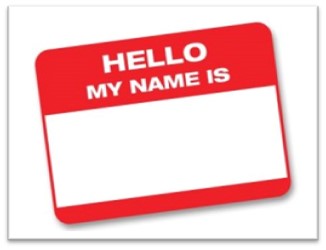Human beings have an obsession for naming things. This is not surprising since it is the basis of all society, all language and all communications.

We name ourselves first. We grow up knowing our labels and very few of us change those labels. This is us adding our own version of metatags with each choice we make of nationality, ethnicity, demography, social groups.
Naming things is an imprecise activity. I might name something a chair, someone else calls it a “silla” or “chaise” or “stol.”
There is no real tag that is intrinsically attached to the thing. It is arbitrary and a convention among us. Plus sometimes a chair is a stool, and sometimes particular kinds of chairs.
As we develop new kinds of chairs, we come up with new labels for the new types. It never seems to be good enough to define by a class all things “chair” as simply chairs. We need a chaise lounge, easy-chair, barcalounger, recliner, and so on and on.
We use this human obsession for naming things all the time in advertising. It starts with branding, a naming of a product that removes it from generic.
Naming things also allows us to position our client’s products effectively because once something is labeled, in human psychology, it is a real and a defined thing. Never mind if it is really real or imagined.
If we have a product that treats a particular condition, we name that condition.
Many dysfunctions have become famous because of advertising – from Coffee Nerves to halitosis to erectile dysfunction. Are the problems real or imagined? You decide. But once they have a label, they are more concrete.
There is no sense in treating something if it doesn’t have a name. Whether it is a real medical condition or not.
Doctors have known this for years. When they give you a diagnosis, it is usually just a description in Greek or Latin.
The same strength from a name works for food nutrients: Omega-3, Oat Bran and so forth. If the ingredient has a name it can be made more important.
The name should also come with a capital letter to make it even more important. Consider, which is worse Halitosis or halitosis. No capital, not important. Not a real name.
A name for things carries an entire army of connotations and expectations with it. All the aspects of identity go with giving a name, including personality, respect – or its opposites.